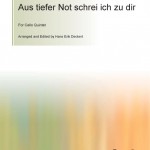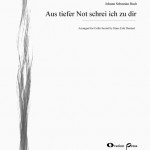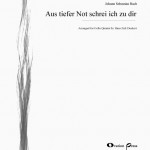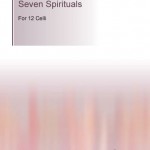Here’s a recap of the scores we released this month:
Delius Elegy for Cello Septet
Delius’ Elegy is a composition that dates from the composer’s final years when he was extremely ill. It was originally written for cello and chamber orchestra and also arranged for cello and piano. In this arrangement for cello ensemble by editor Hans Erik Deckert, the solo cello is the original solo part, while the other cellos perform the orchestral parts.
At a time of mounting chaos and confusion, there were few works that could have broken that silence. Delius’ Elegy, with its great intensity overwhelming harmonic richness, was able to embody and express both the tragedy of times and virtue of fighting through them.
Aus tiefer Not by Bach and Reger
Aus tiefer Not is a Lutheran chorale of which the words were written by Martin Luther himself as a paraphrase of Psalm 130. Published in 1524, it was part of the first Lutheran hymnal and has since them become a part of many subsequent hymnals.
Translated, the text of the first verse reads:
From deep affliction I cry out to you,
Lord God, hear my call;
incline your merciful ear here to me
and be open to my prayer!
For if you want to look at this,
what sin and injustice is done,
who can, Lord, remain before you?
Many composers have set Luther’s text to music, including Johann Sebastian Bach and Max Reger. Arranged by Hans Erik Deckert, these works have taken multiple musical settings. For the Bach chorale, Deckert has given two versions: one for cello quintet and another for cello sextet. For Reger’s treatment Deckert brings us a cello quintet arrangement.
While the essence of the work is consistent through all the versions, both Bach and Reger infuse their very different styles. For Bach, the arrangements for cello ensemble are written with exactly the same pitches as the choir’s original voices, allowing Bach’s polyphony to unfold with overwhelming beauty. On the other hand Reger, being an organist and having made this an organ chorale, placed the cantus firmus in the bass pedal. A performance of this work with cello quintet requires expressive tonal colors while maintaining stoic calmness in order to bring out the complex and rich harmonic texture.
Roither Seven Spirituals for 12 Celli
The Seven Spirituals are Roither’s sophisticated take on seven African-American folk songs. They take full advantage of the complete tonal range of the cello and all the possibilities that a cello ensemble has to offer, including wonderful modulations. Roither succeeds in capturing the warm-hearted atmosphere of the original music. The inspiration for this set of works came from a memory Roither had: when he was younger his mother-in-law would play a record of African-American vocalists singing spirituals to him. That initial spark would blossom into the arrangements the Berlin Philharmonic cellists would first perform.
Roither Ack Värmeland, du sköna for 12 Celli
Ack Värmeland, du sköna was performed by the 12 Cellists of the Berlin Philharmonic in Stockholm for the Swedish King Carl XVI Gustaf of Sweden and Queen Silvia of Sweden (who was born in Germany).
If you want to be kept updated on the latest scores from Ovation Press, be sure to join our mailing list!




















No comments yet.